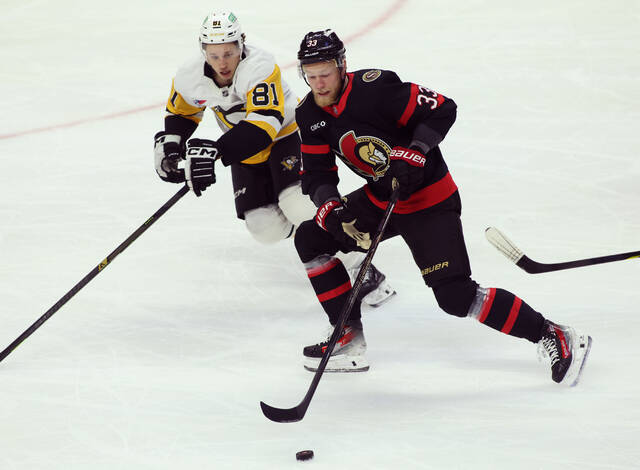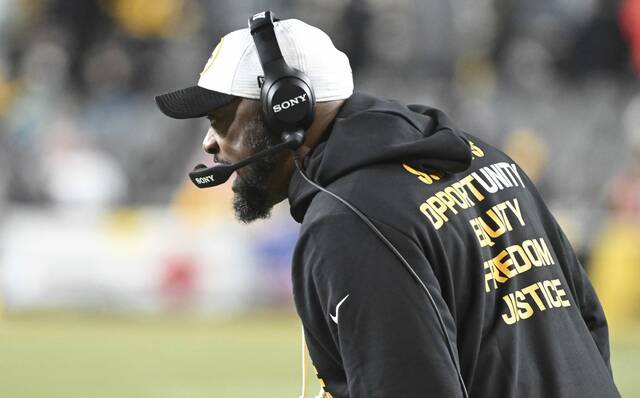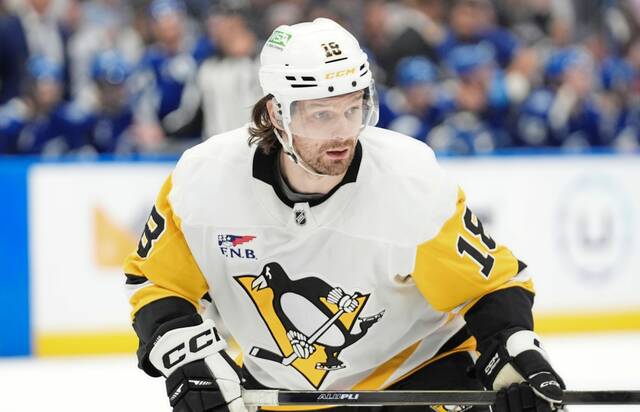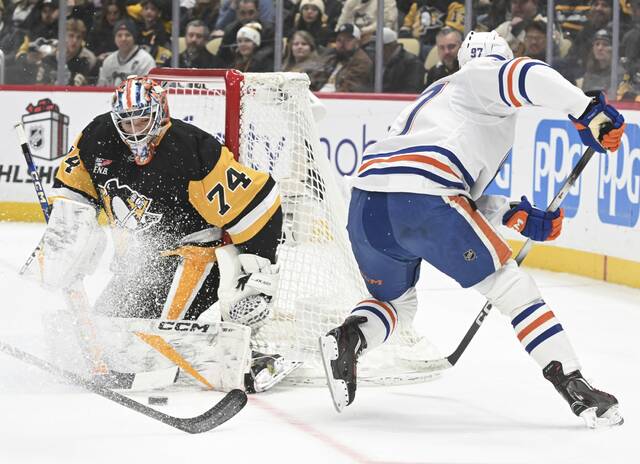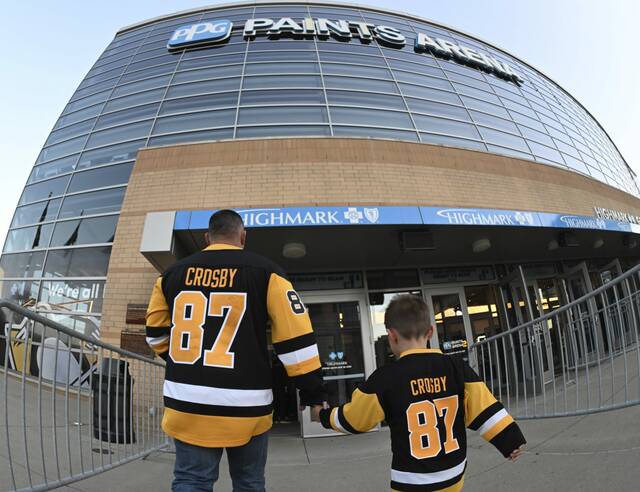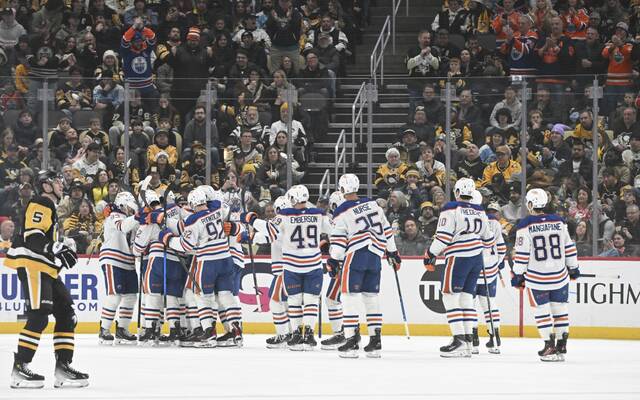While the NHL is on hold because of the ongoing coronavirus pandemic, the Tribune-Review will offer the Double Team project, an examination of the five best players who have contributed substantially to the Penguins and another franchise. For consideration, a player must have played at least the equivalent of a full season for each franchise. (Sorry, Jarome Iginla fans.)
Today, a look at the Montreal Canadiens. One of the most hallowed franchises in all of sports, the Canadiens were founded in 1909 as a charter member of the National Hockey Association (NHA), precursor to the NHL. Following the dissolution of the NHA, the Canadiens helped form the NHL. As the league’s oldest franchise, the Canadiens have won the Stanley Cup a league-high 24 times, including once before the league was formed. The Penguins lost to the Canadiens, 2-1, at the Civic Arena in their first game, Oct. 11, 1967. In 216 all-time games against the Canadiens, the Penguins have a 70-114-31 record.
1. Pierre Larouche, center
During the mid-1970s, the Steelers, Pirates and even Pitt football dominated the sporting scene in Pittsburgh, pushing the Penguins to the margins of relevance.
Larouche was perhaps the only reason to pay attention to the Penguins at that time. He was an attraction.
The No. 8 overall pick in the 1974 draft, Larouche, one of the greatest players in the history of the Quebec Major Junior Hockey League, made an immediate impact in 1974-75 by recording 31 goals and 68 points in 79 games and finishing second in voting for the Calder Memorial Trophy, which recognizes the league’s top rookie.
In his second season of 1975-76, Larouche became the first player in franchise history to reach the 100-point mark, establishing then-team records of 111 points as well as 53 goals in 76 games. He was selected to the All-Star Game that season.
Injuries hindered Larouche throughout the 1976-77 season as he was limited to 65 points and 63 games. The following campaign, Larouche staggered to a poor start with 11 points in 20 games and the Quebec native was traded to the Canadiens, who were in the midst of one of the most dominating runs by a team in NHL history.
Joining a stacked lineup, Larouche was expected to be more of a contributor than a driver with the Canadiens, who had won the previous two Stanley Cup championships. Regardless, he fit in well, putting up 49 points in 44 games following the trade and helping the Canadiens win a third consecutive championship.
Once again, injuries hobbled Larouche in 1978-79 and he was limited to 36 games and 22 points, but he held the Stanley Cup over his head once again that spring.
After star goaltender Ken Dryden retired and head coach Scotty Bowman stepped down, the Canadiens entered a new era in 1979-80 and Larouche appeared poised to become the Canadiens’ next Quebecois icon by becoming the first – and still, only – center to score 50 goals in a season for the franchise. But a lackluster playoff, which ended after two rounds, brought scrutiny onto Larouche, following four consecutive championships.
Larouche once again battled injuries throughout the ensuing two seasons and by December of 1981, he was traded to the Hartford Whalers.
2. Mark Recchi, right winger
As a fourth-round pick in 1988, Recchi broke into the NHL with the Penguins in 1988-89 and by the following season, he had established himself as an NHLer with 30 goals and 67 points in 74 games and a fifth-place finish in voting for the Calder Memorial Trophy.
Perhaps his finest moment as an NHLer came during the 1990-91 season as he helped offset the absence of injured franchise icon Mario Lemieux by leading the team with 113 points (40 goals, 73 assists) in 78 games. An All-Star that season, Recchi contributed 34 points in 24 postseason games that spring as the franchise claimed its first Stanley Cup title.
Recchi was in the midst of another outstanding season in 1991-92 with 33 goals and 70 points in 58 games but was traded to the Philadelphia Flyers as part of a three-team blockbuster in February of 1992.
Nearly three years later, Recchi was on the move again when the Flyers dealt him to the Canadiens. In parts of five seasons in Montreal, Recchi remained a consistently productive force.
Following the trade, Recchi led the Canadiens in scoring with 43 points in only 39 games during the lockout-shortened 1994-95 campaign.
Playing extensively with star center Vincent Damphousse, Recchi reached the 70-point barrier all three full seasons he played with the Canadiens and was a two-time All-Star during that span while missing only one game.
In the midst of a poor season in 1998-99, the Canadiens opted to rebuild and dealt Recchi back to the Flyers by March of 1999.
Recchi’s orbit brought him back to Pittsburgh as a free agent in July of 2004. Following another lockout in 2004-05, Recchi had a productive but brief second act with the Penguins, producing 57 points in 63 games before he was moved again at the 2005 trade deadline to the Carolina Hurricanes, helping that franchise win its first Stanley Cup that spring. Barely a month after that triumph, he re-signed with the Penguins for a third stint.
After a sturdy 2006-07 season in which he produced 68 points in 82 games, Recchi struggled badly at the start of 2007-08 and was waived in December of 2007.
In 2017, Recchi was inducted into the Hockey Hall of Fame.
3. Pete Mahovlich, center
When the Penguins dealt away Larouche, they received Mahovlich and right winger Peter Lee in return. Lee ended up being the more productive player of the two, but Mahovlich was the bigger name, literally. At 6-foot-5 and 210 pounds, he was one of the largest players of the era.
Recording a hat trick in his first game with the Penguins, a 6-4 home win against the Detroit Red Wings on Nov. 30, 1977, Mahovlich’s first season in Pittsburgh saw him appear in 57 games and score 61 points.
In 1977-78, he posted a solid 53 points in 60 games before joining the Red Wings as a free agent during the 1978 offseason.
By the time he joined the Penguins, Mahovlich’s best days were behind him. Virtually all of those days happened in Montreal as a four-time Stanley Cup champion. Acquired from the Red Wings in a trade during the 1969 offseason, Mahovlich made up for a lack of speed with strong stickhandling, sound defense and intelligence.
Mahovlich broke out as an NHLer in 1970-71 with 35 goals and 61 points in 78 games and a selection to the All-Star Game. He even finished 10th in voting for the Hart Memorial Trophy, which recognizes the league’s MVP. His first Stanley Cup ring was earned that postseason by contributing 16 points in 20 games.
Also a member of Montreal’s Stanley Cup teams in 1973, 1976 and 1977, Mahovlich’s best individual season came in 1974-75 when he scored a career-high 117 points in 80 games.
One season later, he followed that up with 105 points in 80 contests.
In 580 career games with the Canadiens, Mahovlich had 569 points, 19th-most in franchise history.
4. Alexei Kovalev, right winger
Kovalev had two bright prolonged periods during his somewhat disjointed 19-year career. They came in Pittsburgh and Montreal.
After frustrating New York Rangers management with his inconsistency, Kovalev was dealt to the Penguins in November of 1998. More of an artist than a hockey player, Kovalev found a suitable tapestry for his skills in Pittsburgh, regularly reaching the 20-goal barrier in the first five seasons he played with the Penguins.
Perhaps the second-most skilled player in franchise history — trailing only Lemieux — Kovalev thrived with the offensively aggressive Penguins of the late 1990s and early 2000s with his greatest individual season coming in 2000-01. Playing on a line with Robert Lang and Martin Straka, Kovalev established a career-high in goals (44) and points (95) in 79 points, earning his first selection for an All-Star Game.
In the midst of another All-Star season in 2002-03, Kovalev was traded back to the Rangers by February of 2003 in a transaction based more in financial constraints than sound roster management.
Kovalev was once again inconsistent in New York and was traded again in March of 2004. In Montreal, Kovalev poetic approach to the game was beloved by fans and he became something of a civic icon.
In his five seasons with the Canadiens, Kovalev led the team in scoring three times. His best campaign with “Le Bleu-Blanc-Rouge,” was in 2007-08, when he put up 35 goals and 84 points in 82 games.
MVP of the 2009 All-Star Game staged in Montreal, Kovalev left as a free agent in the 2009 offseason, joining the Ottawa Senators.
By way of trade, Kovalev returned to Pittsburgh for a brief but unappetizing stretch at the end of the 2010-11 season. In 20 games, he could only produce seven points.
5. Denis Herron, goaltender
Herron had the seemingly impossible task of replacing the legendary Dryden after he was acquired from the Penguins via trade in the 1979 offseason.
But he actually did pretty well. In 1979-80, platooning with Michel Larocque, Herron appeared in 34 games and posted a 25-3-3 record with a 2.52 goals-against average and a .903 save percentage. Along with Larocque and Richard Sevigny, Herron won the Vezina Trophy which, at the time, recognized the goaltenders of the team which allowed the fewest goals.
But the only trophy that counts in Montreal is the Stanley Cup. The Canadiens never won it during Herron’s three-year tenure with the team and he was traded back to the Penguins in September of 1982.
Herron spent most of his 14-year career in Pittsburgh during three different stints. A third-round pick in 1972, Herron made the team out of training camp that same year but never established himself on the NHL level. He was traded to the Kansas City Scouts in 1974 but didn’t last long there, re-signing with the Penguins by 1976 and enjoyed two 20-win seasons, including in 1978-79 when he finished seventh in voting for the Hart Memorial Trophy.
After his stint in Montreal, Herron, who was commonly regarded as one of the top “bad-team goalies” of his time, labored with some intentionally awful Penguins teams in the early 1980s, going 23-67-10 in his final four NHL seasons.
Honorable mention: Arron Asham, right winger; Hal Gill, defenseman; Tom Kostopoulos, right winger; John LeClair, left winger; Ab McDonald, left winger.



